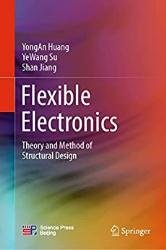Flexible Electronics: Theory and Method of Structural Design
- Добавил: literator
- Дата: 10-01-2023, 21:39
- Комментариев: 0
 Название: Flexible Electronics: Theory and Method of Structural Design
Название: Flexible Electronics: Theory and Method of Structural DesignАвтор: YongAn Huang, YeWang Su, Shan Jiang
Издательство: Springer/Science Press
Год: 2023
Страниц: 423
Язык: английский
Формат: pdf (true)
Размер: 19.6 MB
Flexible electronics are electronics that can be stretched, bent, twisted, and deformed into arbitrary shapes. They break through the bottleneck and monopoly of traditional, rigid IC technologies and represent the next-generation electronics. Flexible electronics were introduced about two decades ago and have attracted increasing interest since then, both because of their compelling physical properties and because of their potential applications. The topic of flexible electronics stands at the crossroad of physics (mechanics, photonics, electromechanical coupling, etc.) and engineering (material engineering, structure engineering, electrical engineering, etc.). Their representative applications include epidermal/implantable/wearable electronics for human health monitoring, artificial skin for robotics or human–robot interaction, and smart sensing skin for aircraft. The flexibility has become the trend of modern life. Should the current growth trend in flexible electronics research continue, it is not inconceivable to witness a near explosion in industrial interest, as what happened over half a century ago in the field of IC electronics and more recently in photonics.
This book provides an overview of the underlying theory and method of structural design for flexible electronics. Compared to intrinsically flexible and stretchable materials, structural engineering has proven its unique advantages, e.g. stretchable inorganic electronics. Based on the mechanical mechanisms, this book discusses the main structural deformation behaviors of flexible electronics, including mechanics of film-on-substrate and fiber-on-substrate, self-similar design with/without substrate, conformal design on rigid/soft substrate, purely in-plane design of serpentine interconnect with/without substrate, buckling-driven self-assembly and kirigami assembly strategies, neutral layer design, and the new materials-based structure design like liquid metals, etc. Moreover, the related advanced fabrication technology, the devices designs and applications of flexible electronics are also presented.
This book is the first one about systematic introduction of structural designs of flexible electronics. It covers the state-of-the-art and comprehensive works on theoretical modeling, numerical simulations, and experiments of the authors and also provides a rather exhaustive perspective on the realm of flexible electronics. These achievements are very useful for further development of flexible electronics. I think this book is a timely and good summary for this rising field in which an increasing number of young researchers are putting their efforts. This is an excellent reference book for both academic research and industrial design of flexible electronics.
Скачать Flexible Electronics: Theory and Method of Structural Design
Внимание
Уважаемый посетитель, Вы зашли на сайт как незарегистрированный пользователь.
Мы рекомендуем Вам зарегистрироваться либо войти на сайт под своим именем.
Уважаемый посетитель, Вы зашли на сайт как незарегистрированный пользователь.
Мы рекомендуем Вам зарегистрироваться либо войти на сайт под своим именем.
Информация
Посетители, находящиеся в группе Гости, не могут оставлять комментарии к данной публикации.
Посетители, находящиеся в группе Гости, не могут оставлять комментарии к данной публикации.
